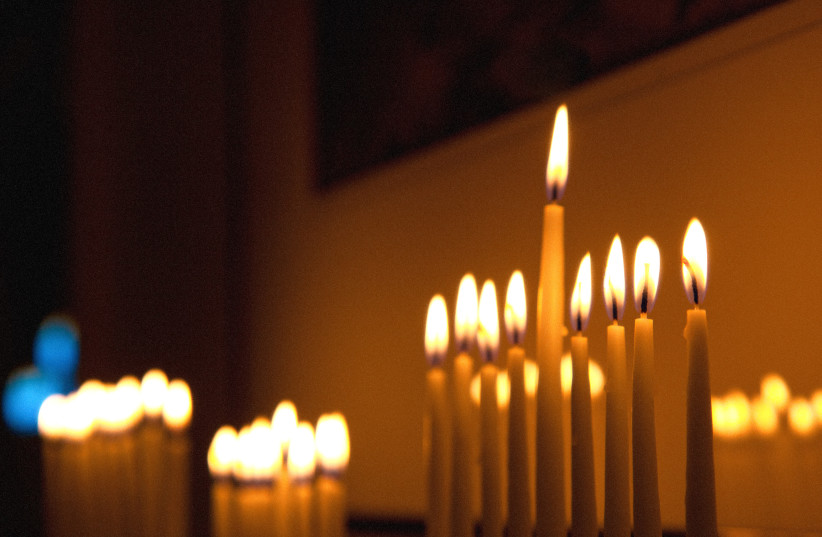There are two focal points that we mark on Hanukkah.
The first is described in the Babylonian Talmud: “When the Greeks entered the Temple, they defiled all the oils in it. And when the Hasmonean monarchy prevailed and conquered them, they searched and found only one cruse of oil with the high priest’s seal, and it contained only enough for one day’s lighting.
“A miracle occurred, and they lit the menorah from it for eight days. The following year, they established these [eight] days as a holiday with praise and thanksgiving” (Babylonian Talmud, Shabbat: 21).
The second focal point is the extraordinary courage and victory of the Maccabees-Hasmoneans over the Seleucid Greek army that had conquered the Land of Israel and the Temple in Jerusalem. We commemorate this victory with an addition to the prayer during the days of Hanukkah:
“For the miracles, the wonders, the salvations, and the battles... and in your great compassion, You stood by them in their time of distress... You delivered the strong into the hands of the weak, the many into the hands of the few, the impure into the hands of the pure, the wicked into the hands of the righteous, and the arrogant into the hands of those occupied with Your Torah. And for Yourself, You made a great and holy name in your world, and for Your people Israel, You performed a great deliverance and redemption as on this day.”

We thank the Almighty not only for the victory but also for “the battles,” meaning for the courage that was in the hearts of the Maccabees who fought against the coercion the Greeks sought to impose on the Jews to abandon their way of life and adopt the Greek way of life, which included idol worship and veneration of the body.
The Maccabees and the oil: The two miracles of Hanukkah
At first glance, these two miracles seem unrelated. The Maccabees won the war, and afterward they found a small jug with pure oil that allowed them to light the menorah in the Temple miraculously for eight days. However, a closer look at the meaning of the second miracle reveals that it paints the first miracle in a different light, illuminating it even more brightly.
AFTER YEARS of successive wars, Judah the Maccabee and his brothers fulfilled their dream: to purify the Temple from the Greek idols that were placed in it and to light the menorah – the symbol of light that the Jewish Temple radiated to all humanity.
Unfortunately, the amount of pure oil they found was exceedingly small. Just a small jug with enough oil for one day. But a surprise awaited them: At the end of the first day, they realized that the amount of oil had diminished only by an eighth, and there was enough oil to light the menorah in the following days.
The Maccabees surely stood in awe before this supernatural phenomenon that unfolded before them and sought to understand its symbolism. What does this second miracle, that the small amount of oil can last for eight days, come to teach?
The historical reality that the Maccabees faced was not simple. In fact, most Jews in the Land of Israel surrendered, willingly or unwillingly, to the mighty and trained Seleucid-Greek conqueror and his idolatrous culture.
The Maccabees were a small minority that chose to courageously fight for the independence of the Jewish state and the Jewish faith. If we seek a meaningful representation of the social situation of the Jewish people at that time, it seems that we can say that most of the oil was defiled and not suitable for lighting the menorah, and only one small jug, namely the Maccabees, remained pure.
The Maccabees undoubtedly faced mocking voices, voices of despair and submission. What chance did a small group have against the formidable and disciplined Seleucid-Greek army? But they did not give up; they went to war. Not to a suicidal attack but to a war destined for victory. And the unbelievable happened: They won!
But would they also overcome the despair that had spread among the people? Would they succeed in enlightening the entire nation? Was there a chance that their spiritual heroism would become the heritage of the masses?
Then they found the small jug with the pure oil, which was supposed to last for only one day. But it burned one day, and another day, and another one, and another. The tiny amount of oil in this jug burned continuously for eight consecutive days.
The Maccabees understood the message: Yes, pure oil, even in small quantities, can illuminate much more than meets the eye. Pure faith can illuminate all segments of the people and infiltrate the hearts of the masses.
Not in vain did the festival of Hanukkah become a national holiday for the Jewish people. A small minority can lead, prevail, and proclaim the message of faith to the entire nation. This is what we celebrate – the courage of those isolated Jews who did not despair; and thanks to them, we continue the legacy of generations, the legacy of faith and courage. ■
The writer is rabbi of the Western Wall and Holy Sites.
